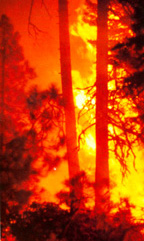
 |
| We Have Become a Civilization Based on Burning! | |||
|
|
Click on a choice: |
||
|
But, How Does This Affect Us? The increasing amount of greenhouse gases being spewed into the air appears to be accelerating the greenhouse effect, like adding layers to our insulating atmospheric blanket. Even though some of the carbon goes into the oceans and some is absorbed by growing trees, the amount of carbon dioxide in the air continues to rise. This is raising the global mean temperature, causing the Earth to warm up at an alarmingly fast rate. Past catastrophic events that fast-forwarded the global climate have had devastating effects on most species who couldn't adapt to drastically new conditions. There is general consensus that global warming will dramatically raise world sea levels by melting polar ice caps and warming and expanding ocean waters. Predictions range anywhere from a 15 to a 95 cm (.5 to 3 feet) rise by 2070. Storms and flooding could be more intense, and global warming may affect the global climate system leading to greater extremes of temperature. A Rise in Sea Level Has Many Potential Consequences There will be major changes in the balance of living communities as species try to adapt to a rise in the seas. This will affect soil conditions, temperature, and rainfall, as well as possible food production and population movements. In fact, some island nations may disappear, and many forests globally will be hard-put to adapt to warmer temperatures.
|

|
||
| © 2004 Delphi International. All Rights Reserved. |